|
|
|
Sort Order |
|
|
|
Items / Page
|
|
|
|
|
|
|
| Srl | Item |
| 1 |
ID:
172569
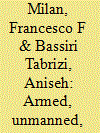

|
|
|
|
|
| Summary/Abstract |
Current dynamics in UCAV proliferation in the Middle East signal that combat drones have become key strategic enablers for state actors in the region, and are no longer seen as an optional asset. With the development of a multitude of indigenous UCAV projects, and the arrival of Chinese-made armed drones on the international market, military procurement in the Middle East has entered a new phase, in which possessing armed drone capabilities is becoming the norm. This article examines the operational and strategic considerations driving Middle Eastern states’ UCAV procurement policies, analysing those countries who have been focusing on armed drones for combat purposes and additional intelligence, surveillance, target acquisition, and reconnaissance (ISTAR) needs. The main drivers behind this trend are the operational and strategic advantages brought about by UCAVs, where the benefits related to cost, reliability, and operational risk mitigation are matched by the increased ability to project power that the platform allows, either through deniability or by making UCAVs available to proxies and allies.
|
|
|
|
|
|
|
|
|
|
|
|
|
|
|
|
| 2 |
ID:
159981
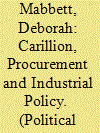

|
|
|
| 3 |
ID:
073079
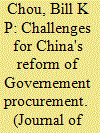

|
|
|
| 4 |
ID:
091210
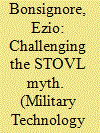

|
|
|
|
|
| Publication |
2009.
|
| Summary/Abstract |
It is this article's contention that such a heavy emphasis on STOVL technologies and operational concepts does raise a number of perplexing questions, and it is hardly justifiable in operational terms. Rather there are reasons to suspect that the real rationale for this keen interest towards the F-35B is eminently political, and it has to do with the air forces desire to maintain their traditional role as the main, and ideally only, purveyors of air power in our age of expeditionary conflicts.
|
|
|
|
|
|
|
|
|
|
|
|
|
|
|
|
| 5 |
ID:
087195


|
|
|
|
|
| Publication |
2009.
|
| Summary/Abstract |
With some countries investing in defence while others don't, the Latin American region faces times of change in the military balance. Combat aviation is on the lead of this change, as the high prices of contemporary fighters make it difficult for politicians to agree on the required investments.
|
|
|
|
|
|
|
|
|
|
|
|
|
|
|
|
| 6 |
ID:
172773
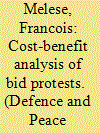

|
|
|
|
|
| Summary/Abstract |
The goal of any procurement process is to obtain ‘value for money.’ Bid protest systems are intended to help. The U.S. Department of Defense, NATO, the EU, UN, OECD, and WTO, all authorize losing bidders to protest public procurements. The threat of a protest is meant to increase government accountability, and encourage vendor participation. An extensive legal and regulatory literature discusses intended benefits of protests, but is surprisingly silent about the costs. The goal of this study is to examine both costs and benefits. Military acquisition offers an illustration. The dual objective is to minimize corruption, and maximize competition. Sadly, protest systems can inadvertently discourage both. Moreover, past protests by defense companies have generated significant costs, and triggered dangerous delays of critical defense equipment, materiel, services, and supplies required for national security. The static, probabilistic, micro-economic, partial equilibrium, representative bidder model presented in this paper offers a cautionary tale for defense organizations, government agencies, countries, and international institutions that authorize bid protests. The model reveals multiple potential deficiencies of protest systems, and recommends analysis of portfolios of alternatives to eliminate fraud and favoritism, and increase competition, to improve procurement outcomes.
|
|
|
|
|
|
|
|
|
|
|
|
|
|
|
|
| 7 |
ID:
144152
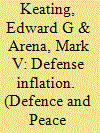

|
|
|
|
|
| Summary/Abstract |
US Department of Defense (DoD) procurement and maintenance costs have risen considerably faster than economy-wide inflation over the last several decades. This outcome has occurred in large part because DoD decision-makers have demanded more complex, better maintained systems over time. Defense inflation is likely to abate when resourcing levels no longer accommodate these demands. Defense inflation should be viewed partially as a symptom, not just as a cause, of increased defense spending.
|
|
|
|
|
|
|
|
|
|
|
|
|
|
|
|
| 8 |
ID:
167176
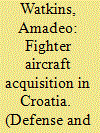

|
|
|
|
|
| Summary/Abstract |
The possibility for Croatia to obtain new fighter aircraft is not new, as this option has been publicly debated for at least a decade. A sudden decision to advance the acquisition of a limited number of fighter aircraft was made in 2017 with an international tendering process concluding in early 2018. Through open source material, this paper will look at this procurement process by examining the relationship between policy and strategic thinking on the one side, and policy delivery on the other, and evaluate why the tendering process failed in achieving envisaged results. The paper concludes that the problems facing the Croatian aircraft acquisition process stem from at least two interrelated factors: firstly, at the operational level, the failure of the procurement was the direct result of mismanaged tendering procedures linked to the wider public administration reform process; and secondly, at the strategic level, inherently complex civil-military relations and related cultural aspects which have not been adequately addressed over the past decades. The result was a failure to deliver on government policy, something which this paper argues will need to be addressed over the medium to long term.
|
|
|
|
|
|
|
|
|
|
|
|
|
|
|
|
| 9 |
ID:
128962


|
|
|
| 10 |
ID:
185355


|
|
|
|
|
| Summary/Abstract |
Why did Denmark and Norway opt for respectively a domestic “make” and a “buy” abroad approach when acquiring comparable major surface combatants given both host a capable shipbuilding industry? Three explanations are examined: (1) Balancing concerns inch small states towards “buy” abroad decisions, if requirements are deemed urgent and if junior alliance partners fear abandonment by senior partners. Junior partners by contrast prefer “make at home” if entanglement is a greater concern. (2) National innovation systems can be biased towards large projects, such as complex warship programmes, or have a knowledge diffusion focus emphasising niche capabilities. The former point to a “make” decision whereas the latter is inclined towards “buy.” (3) Domestic defence industry advocate “make” decisions with the qualification that weaker firms favour “buy” with offset arrangements. Political executives balance job creation with military capability, but recent adverse domestic procurement experiences may prompt governments to favour “buy.”
|
|
|
|
|
|
|
|
|
|
|
|
|
|
|
|
| 11 |
ID:
150615


|
|
|
|
|
| Summary/Abstract |
In the energy trilemma of reliability, sustainability and affordability, politicians treat reliability as over-riding. The EU assumes the energy-only Target Electricity Model will deliver reliability but the UK argues that a capacity remuneration mechanism is needed. This paper argues that capacity auctions tend to over-procure capacity, exacerbating the missing money problem they were designed to address. The bias is further exacerbated by failing to address some of the missing market problems also neglected in the debate. It examines the case for, criticisms of, and outcome of the first GB capacity auction and problems of trading between different capacity markets.
|
|
|
|
|
|
|
|
|
|
|
|
|
|
|
|
| 12 |
ID:
087194
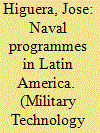

|
|
|
|
|
| Publication |
2009.
|
| Summary/Abstract |
Despite the impact of the global economic crisis, the major Latin American coutries are still sustaining reasonable defence budgets, which will hopefuly allow for the realization of several naval procurement programmes. This article takes a closer look at the situation in Brazil, Chile, Colombia, Ecuador, Mexico, and Venezuela.
|
|
|
|
|
|
|
|
|
|
|
|
|
|
|
|
| 13 |
ID:
150759
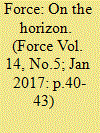

|
|
|
| 14 |
ID:
176965
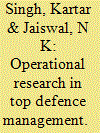

|
|
|
| 15 |
ID:
150260
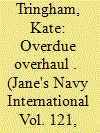

|
|
|
| 16 |
ID:
166932
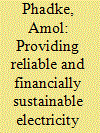

|
|
|
|
|
| Summary/Abstract |
In India, 46 million, mostly rural, households lack access to electricity – over 50% of those are in the states of Bihar and Uttar Pradesh. While India has set an aggressive goal of extending the grid to all households by 2019, grid extension does not necessarily imply reliable electricity access. Indian utilities face a financial disincentive to supplying reliable electricity in rural areas because of subsidized tariffs and low consumer willingness-to-pay. Tariff subsidies for full household electrification in these states would be about Rs 15,000 Cr per year, which is two-times the existing subsidies and equivalent to 20–30% of their annual utility revenues. We find that super-efficient lamps, TVs, and fans can reduce the energy consumption of a rural household by over 70% cost-effectively, resulting in a net reduction in the total subsidy burden. Reduced consumption offers an opportunity to raise consumer tariffs while ensuring consumers’ monthly electricity bills reduced. We also argue that super-efficient appliances make consumer-side storage cost-effective, leading to greater consumer willingness-to-pay. We recommend adoption of super-efficient appliances as part of the electricity access initiative in India, and electricity service based tariff setting as the next policy steps towards providing a reliable and sustainable electricity access.
|
|
|
|
|
|
|
|
|
|
|
|
|
|
|
|
| 17 |
ID:
088110
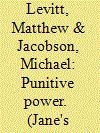

|
|
|
|
|
| Publication |
2009.
|
| Summary/Abstract |
Sanctions are a frequent yet controversial tool used by the international community in dealing with proliferant sates and nuclear non-compliance
|
|
|
|
|
|
|
|
|
|
|
|
|
|
|
|
| 18 |
ID:
178050


|
|
|
|
|
| Summary/Abstract |
A significant change in Turkey’s foreign policy came with an active engagement in regional issues that, in turn, produced more risks, new areas of interest, regional policy arrangements, and different security challenges in the 2000s. In this vein, Turkey’s military spending has increased to sustain its active policy behavior and goals, both regionally and globally. This article examines Turkey’s military spending between 2000 and 2018 by using Stockholm International Peace Research Institute’s (SIPRI) Military Expenditure Database and its effects on bilateral and regional relations. It argues that the increase in Turkey’s military spending in the 2000s can be explained not only by diversified security threats but also by the quest for autonomy, the desire to be a regional actor, economic capacity increase, efforts to nationalize the defense industry, and the North Atlantic Treaty Organization (NATO) alliance’s inability to form a sufficient umbrella time in the face of security threats, notably in the face of missile threats. The results show that the traditional alliances and strategic cooperation do not guarantee Turkey’s military demands, and its military spending increases, while the proportion of military spending in GDP falls, due to economic growth.
|
|
|
|
|
|
|
|
|
|
|
|
|
|
|
|
| 19 |
ID:
162684


|
|
|
|
|
| Summary/Abstract |
Over the past two decades, the United States has increasingly turned to targeted sanctions and export restrictions, such as those imposed against Iran and North Korea, in order to curb the spread of weapons of mass destruction. One vexing problem, however, is how to contend with jurisdictional hurdles when the violations occur overseas, in countries that are unable or unwilling to assist US enforcement efforts. To solve this problem, US prosecutors are turning to strategies with significant extraterritorial implications— that is, exercising legal authority beyond national borders. One such tool is to use civil legal procedures to seize assets linked to sanctions or export-control violations in jurisdictions that lack cooperative arrangements with US enforcement agencies. While this may be an attractive strategy to bolster enforcement efforts against overseas illicit procurement, using such tools is not without consequence. This article explores the political, legal, and technical implications of enforcing extraterritorial controls against overseas non-state actors by exploring the recent uses of civil-asset forfeiture against Iranian and North Korean procurement networks.
|
|
|
|
|
|
|
|
|
|
|
|
|
|
|
|
| 20 |
ID:
129328
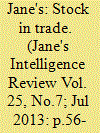

|
|
|
|
|
|
|
|